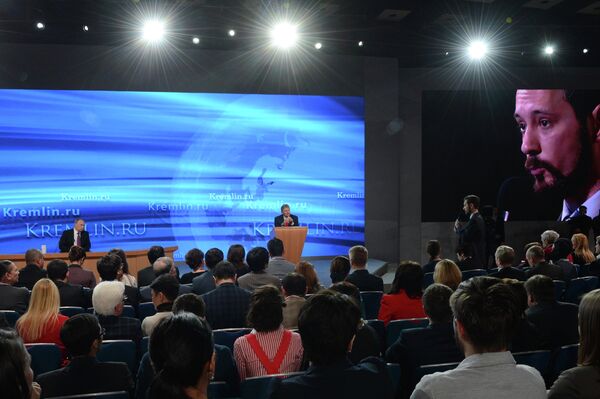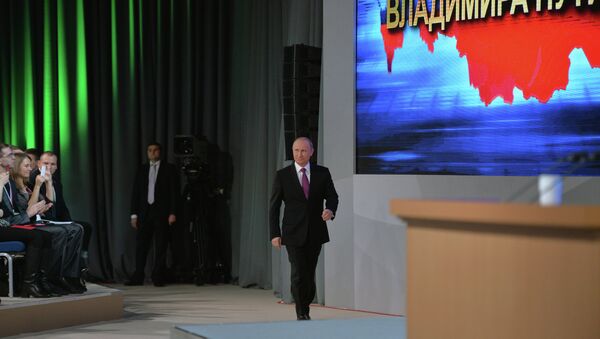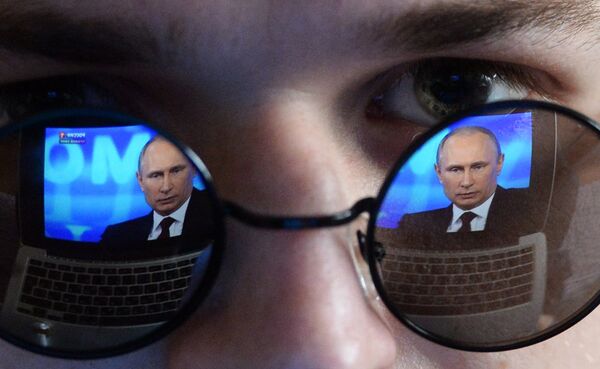This year will mark Vladimir Putin's eleventh annual Q&A session; the president will brief Russian and foreign journalists on the work done during the year and answer questions which are of particular interest to the reporters.
Last year's event was attended by 1,259 Russian and foreign journalists The president faced a total of 53 questions over three hours and 10 minutes from 38 journalists (out of which 30 were Russian and 8 foreign).
“I believe we all know that the main issue of concern for this country’s citizens is the state of the economy, the national currency and how all this could influence developments in society. I will try to briefly describe this situation and say how I expect it to progress. Basically, that is where we could end this news conference. However, if you have any further questions, I will try to answer them.”
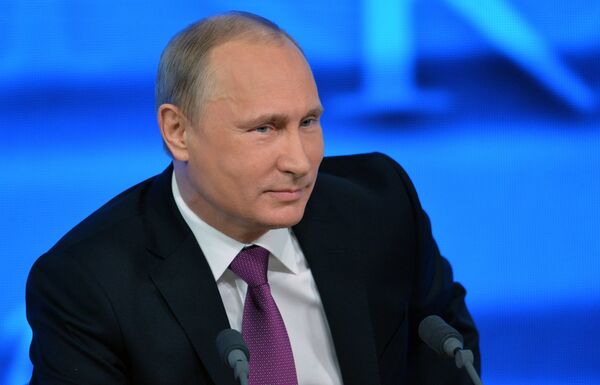
On Russia’s Development
The president then stressed that the situation in the country had obviously been provoked primarily by external factors, primarily the price of energy resources, of oil and consequently of gas as well.
The same topics however remain timely this year.
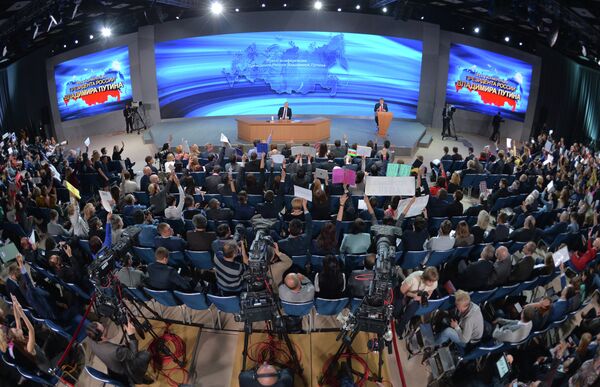
“I hope that the drop in the foreign currency exchange rate yesterday and today, and the growth of our national currency, the ruble, will continue. Is this possible? It is. Could oil prices continue to fall, and would this influence our national currency and consequently all the other economic indexes, including inflation? Yes, this is possible.”
“What is the basis for my optimism? The idea that the economy is bound to adjust to life and work amid low prices for energy resources. This will become a fact of life.”
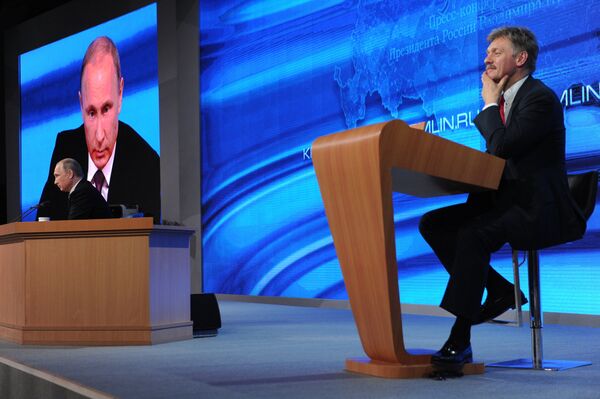
“Every company, just like every individual, tries to save ‘for a rainy day’. Is such behavior economically justified? In terms of economic logic, it is not. Nevertheless, companies do it, and we now see a certain result, the ‘rebound’ is happening.”
However the reporters were also interested in Russia’s foreign policy.
On the 25th Anniversary of the Fall of the Berlin Wall
“Didn’t they tell us after the fall of the Berlin Wall that NATO would not expand eastwards? However, the expansion started immediately. There were two waves of expansion. Is that not a wall? True, it is a virtual wall, but it was coming up. What about the anti-missile defense system next to our borders? Is that not a wall?”
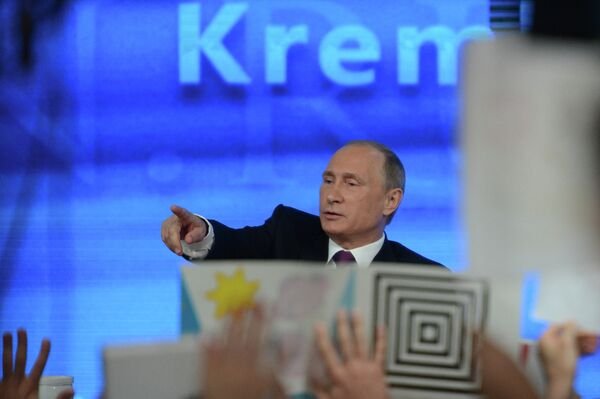
“You see, nobody has ever stopped. This is the main issue of current international relations. Our partners never stopped. They decided they were the winners, they were an empire, while all the others were their vassals, and they needed to put the squeeze on them,” he said.
“They never stopped building walls, despite all our attempts at working together without any dividing lines in Europe and in the world at large.”
On Ukraine
“I believe that our tough stand on certain critical situations, including that in the Ukraine, should send a message to our partners that the best thing to do is to stop building walls and to start building a common humanitarian space of security and economic freedom.”
“The self-defense fighters of the southeast were not the ones who sent troops to Kiev. On the contrary, the Kiev authorities amassed their military forces in the southeast of Ukraine, and are using multiple rocket launchers, artillery and fighter jets.”
“Instead of at least trying to engage in a dialogue with them, Kiev started by sending law enforcers, the police force, but when that didn’t work out, they sent in the army, and since that didn’t work out either, they are now trying to settle the issue by using other forceful methods, [such as] the economic blockade.”
On Russia Paying a Price for Preserving Itself as a Nation
“This [the current hardships related to Russia’s economic development] is actually the price we have to pay for our natural aspiration to preserve ourselves as a nation, as a civilization, as a state.”
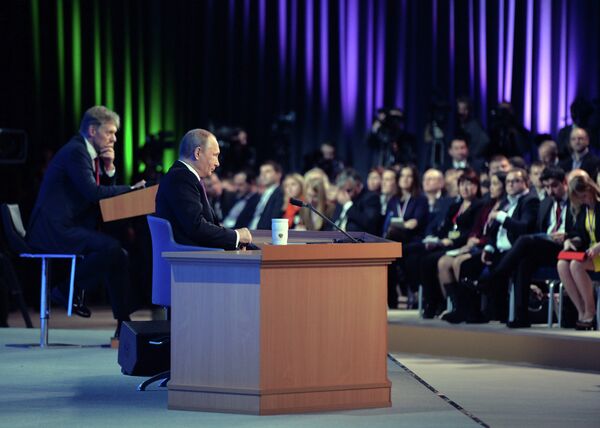
“Russia opened itself to our partners. What did we see? A direct and full-fledged support of terrorism in the North Caucasus. They directly supported terrorism, do you understand? Is that what partners usually do? I won’t go into details on that, but this is an established fact. And everyone knows it.”
“Let me remind you about the preparations for the 2014 Olympics, our inspiration and enthusiasm to organize a festive event not only for Russian sports fans, but for sports fans all over the world. However, and this is an evident truth, unprecedented and clearly orchestrated attempts were made to discredit our efforts to organize and host the Olympics. This is an undeniable fact! Who needs to do so and for what reason? And so on and so forth.”
“You know, at the Valdai [International Discussion] Club, I gave an example of our most recognizable symbol. It is a bear protecting his taiga. You see, if we continue the analogy, sometimes I think that maybe it would be best if our bear just sat still. Maybe he should stop chasing pigs and boars around the taiga and start picking berries and eating honey. Maybe then he will be left alone. But no, he won’t be! Because someone will always try to chain him up."
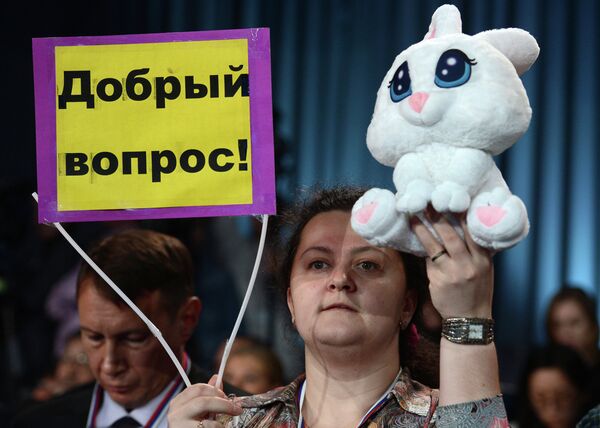
"As soon as he’s chained they will tear out his teeth and claws. In this analogy, I am referring to the power of nuclear deterrence. As soon as – God forbid – it happens and they no longer need the bear, the taiga will be taken over.”
“We have heard it even from high-level officials, that it is unfair that the whole of Siberia with its immense resources belongs to Russia in its entirety. Why exactly is it unfair? So it is fair to snatch Texas from Mexico but it is unfair that we are working on our own land – no, we have to share.”
Continuing his analogy, he said: “so, it is not about Crimea but about us protecting our independence, our sovereignty and our right to exist. That is what we should all realize.”
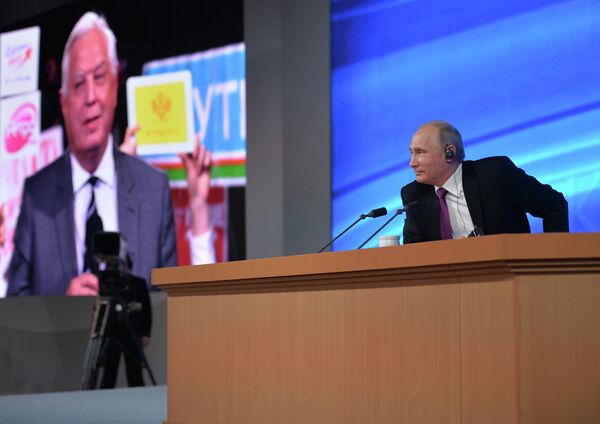
On the Prospects for a New Cold War and Russia’s “Aggressiveness”
“Russia did contribute, but only insofar as it is more and more firmly protecting its national interests. We are not attacking in the political sense of the word. We are not attacking anyone. We are only protecting our interests. Our Western partners – and especially our US partners – are displeased with us for doing exactly that, not because we are allowing security-related activity that provokes tension.”
“Now, US bases are scattered around the globe – and you’re telling me Russia is behaving aggressively? Do you have any common sense at all? What are US armed forces doing in Europe, also with tactical nuclear weapons? What are they doing there?”
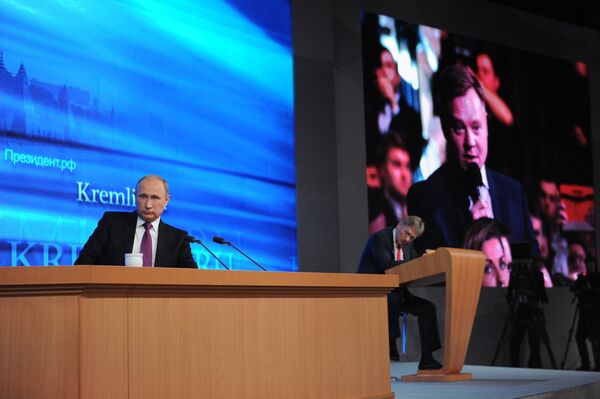
“Are we moving our forces to the borders of the United States or other countries? Who is moving NATO bases and other military infrastructure towards us? We aren’t."
"Is anyone listening to us? Is anyone engaging in some dialogue with us about it? No. No dialogue at all. All we hear is 'that’s none of your business. Every country has the right to choose its way to ensure its own security.' All right, but we have the right to do so too. Why can’t we?”
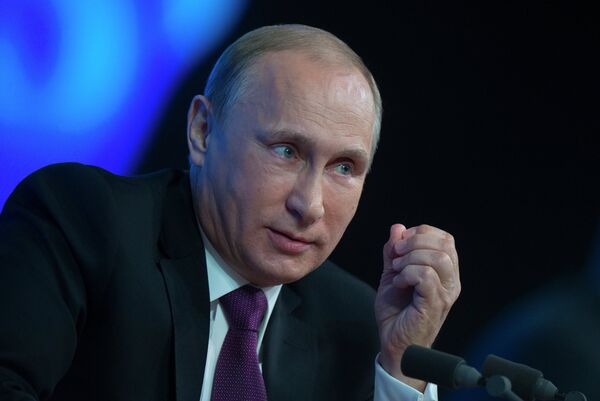
“Who was it that withdrew unilaterally from the ABM Treaty, one of the cornerstones of the global security system? Was it Russia? No, it wasn’t. The United States did this, unilaterally. They are creating threats for us, they are deploying their strategic missile defense components not just in Alaska, but in Europe as well – in Romania and Poland, very close to us. And you’re telling me we are pursuing an aggressive policy?”
On the Support of the Russian People
“There is no other stability as solid as the support of the Russian people. I don’t think you have any doubts as to whether our key foreign and domestic policy initiatives benefit from such support.”
“Why is this happening? Because people feel deep down inside that we, and I in particular, are acting in the interests of the overwhelming majority of Russians.”
